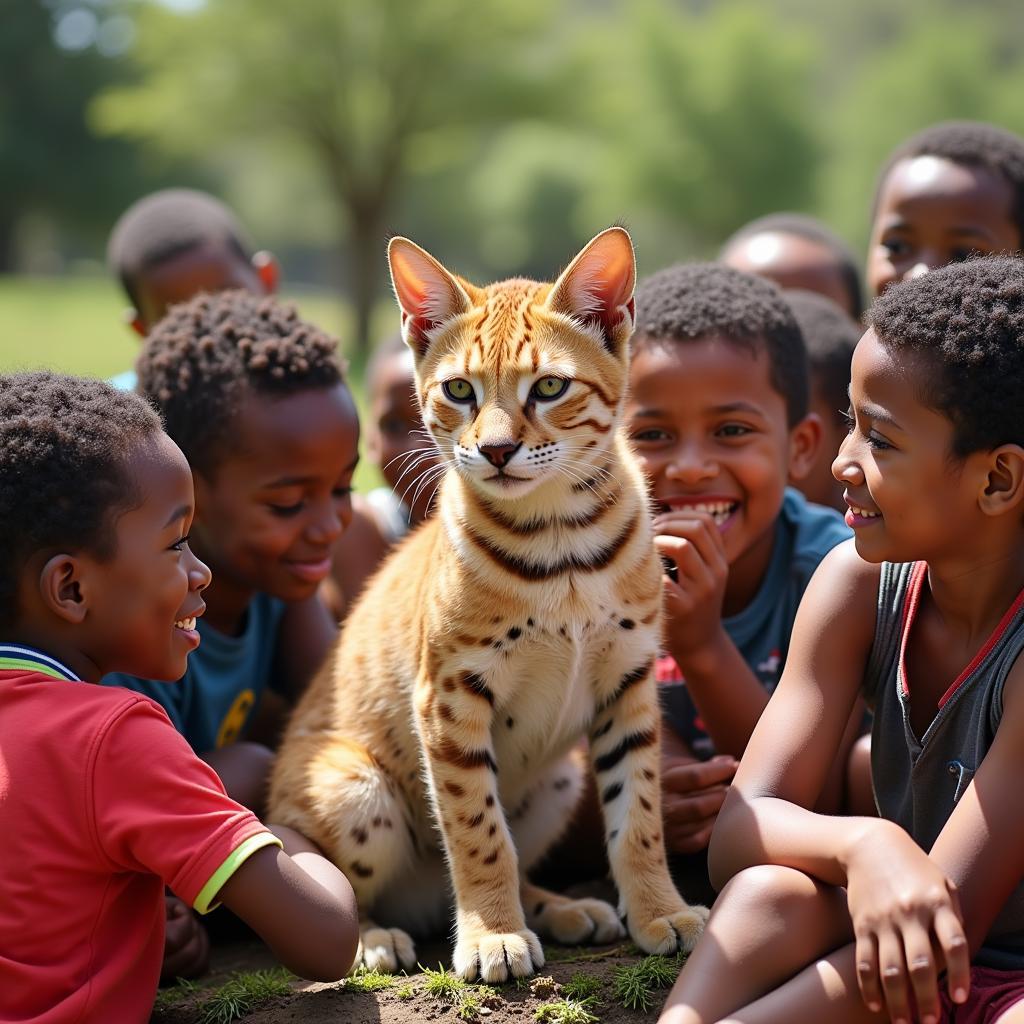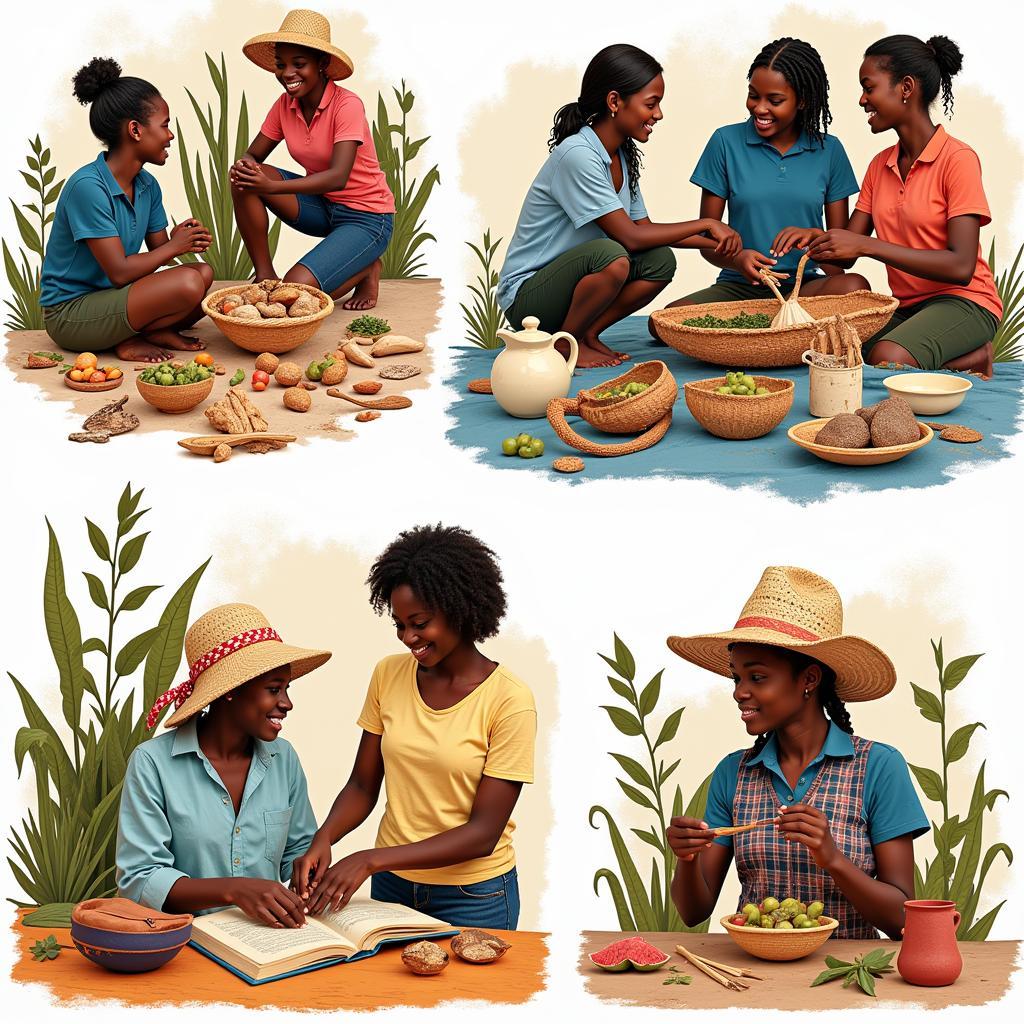African Golden Cat Population: A Vulnerable Treasure
The African Golden Cat Population faces an uncertain future. This elusive feline, a captivating symbol of African biodiversity, is increasingly threatened by habitat loss and other human-induced pressures. Understanding the factors affecting their numbers is crucial for effective conservation efforts. After the introduction, you’ll find more information related to the African golden cat’s habitat and conservation status.
Unveiling the Secrets of the African Golden Cat
The African golden cat (Caracal aurata) is a medium-sized wild cat native to the rainforests of West and Central Africa. These elusive creatures are known for their striking golden-brown fur, although variations in color, including shades of reddish-brown and grey, exist. Their secretive nature and preference for dense forest habitats make them difficult to study, contributing to the challenges in accurately assessing the African golden cat population. Their diet primarily consists of rodents, birds, and small ungulates. The African golden cat plays a vital role in maintaining the delicate balance of its forest ecosystem. Learn more about other fascinating African cat breeds. african cats breeds
Habitat and Distribution of the African Golden Cat
African golden cats are found primarily in the tropical rainforests of equatorial Africa, spanning from Senegal in the west to Kenya in the east. They require dense undergrowth and proximity to water sources. Sadly, the ongoing deforestation across their range poses a significant threat to the African golden cat population. The conversion of forests for agriculture, logging, and mining activities fragments their habitat, isolating populations and increasing their vulnerability to threats.
Threats to the African Golden Cat Population
Besides habitat loss, several other factors contribute to the decline in African golden cat population numbers. These include:
- Bushmeat Hunting: African golden cats are often caught in snares and traps set for other animals, leading to unintended bycatch.
- Human-Wildlife Conflict: As human settlements encroach upon their natural habitat, conflicts can arise, sometimes resulting in the killing of golden cats.
- Disease: Exposure to diseases from domestic animals can impact wild populations.
- Illegal Pet Trade: Although less prevalent than other threats, the capture of golden cats for the illegal pet trade also poses a risk. Just like the African golden cat, many other burrowing mammals in Africa are endangered. african burrowing mammals
Conservation Efforts for the African Golden Cat
Recognizing the urgent need to protect this vulnerable species, various conservation initiatives are underway to safeguard the African golden cat population. These include:
- Habitat Protection and Restoration: Efforts are being made to protect existing rainforest areas and restore degraded habitats to create corridors that connect fragmented populations.
- Community Engagement: Working with local communities is crucial for promoting sustainable practices and reducing human-wildlife conflict. This includes raising awareness about the importance of the golden cat and its role in the ecosystem.
- Anti-Poaching Patrols: Increased patrols help to combat illegal hunting and trapping activities.
- Research and Monitoring: Ongoing research and monitoring programs are essential for understanding the population dynamics and informing conservation strategies. Similar efforts are being made for the African lion, whose IUCN status is a major concern. african lion iucn status
The Future of the African Golden Cat Population
The future of the African golden cat population hinges on the success of ongoing and future conservation efforts. Protecting their habitat, mitigating threats, and promoting sustainable practices are crucial for ensuring the long-term survival of this magnificent species. This echoes the conservation challenges faced by the African golden eagle. african golden eagle
Dr. Aminata Kone, a leading wildlife biologist specializing in African carnivores, emphasizes the importance of community involvement: “Conservation success relies heavily on collaboration with local communities. Empowering them to become stewards of their environment is key to protecting the African golden cat and other vulnerable species.”
Prof. Emeka Nnadi, a renowned conservationist, highlights the urgency of action: “The African golden cat is a precious part of Africa’s natural heritage. We must act now to ensure that future generations can continue to marvel at its beauty and ecological significance.” It is important to note that conservation also helps preserve the legacy of African civilizations. african civilization timeline
 The Future of African Golden Cat Conservation
The Future of African Golden Cat Conservation
Conclusion
The African golden cat population is facing increasing pressure, but with dedicated conservation efforts, there is hope for their survival. By understanding the threats they face and supporting initiatives aimed at protecting them, we can contribute to securing a future for this elusive and captivating feline.
FAQ
- What does an African golden cat look like?
- Where do African golden cats live?
- What do African golden cats eat?
- What are the main threats to the African golden cat population?
- What is being done to protect African golden cats?
- How can I help conserve African golden cats?
- What is the IUCN status of the African golden cat?
Scenarios and Frequently Asked Questions
Scenario 1: I saw an African golden cat near my village. What should I do?
Contact your local wildlife authorities to report the sighting. This information helps researchers track the distribution and movement of the cats.
Scenario 2: I found a trapped African golden cat. What should I do?
Do not approach the trapped animal. Contact your local wildlife authorities immediately.
Further Exploration
Explore more about other endangered species and conservation efforts on our website.
Need help?
For further assistance or inquiries regarding African wildlife, please contact us:
Phone: +255768904061
Email: kaka.mag@gmail.com
Address: Mbarali DC Mawindi, Kangaga, Tanzania.
Our customer service team is available 24/7.

